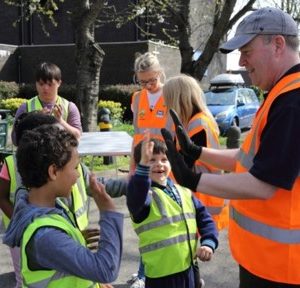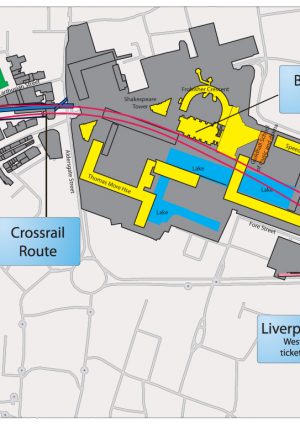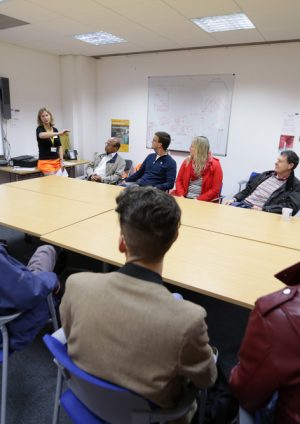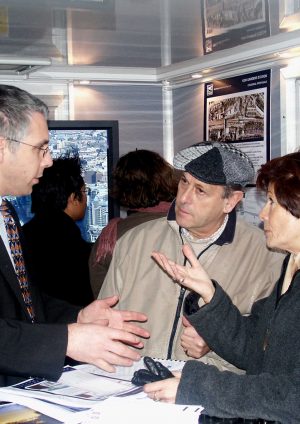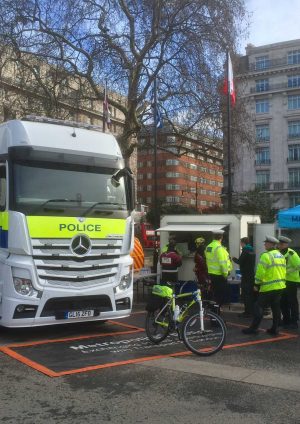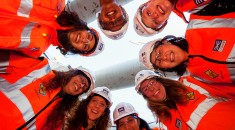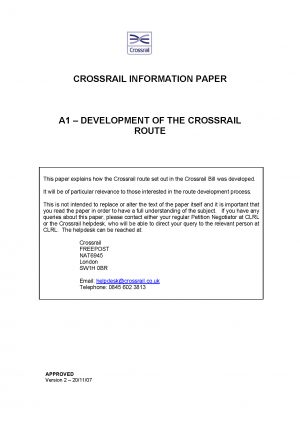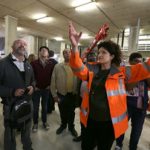 The aim of Community Relations activity for Crossrail is to establish and maintain an outstanding reputation with local authorities, neighbouring residents and businesses and other local stakeholders to enable the successful delivery of Crossrail.
The aim of Community Relations activity for Crossrail is to establish and maintain an outstanding reputation with local authorities, neighbouring residents and businesses and other local stakeholders to enable the successful delivery of Crossrail.
The Crossrail Act 2008 established the formal standards that the construction process must stick to. These are explained in Crossrail’s Environmental Minimum Requirements and the Construction Code.
At every site Crossrail liaises closely with local authorities, local representatives and other interested groups to manage and minimise the effects of construction.
Contractors employ community relations representatives who distribute information about the works and provide a first contact for local communities.
The Crossrail Limited Community Relations department consists of Area Community Relations Managers and officers and the Crossrail Helpdesk which is available 24 hours a day, 7 days a week to provide answers to questions and act on complaints from members of the public. They work alongside contractors to speedily resolve any problems that might occur.
This topic area includes content giving examples of how communication with communities has been established and ensured to be effective.
| Summary |
Publication date |
Document Type |
Topic area: Community Relations Crossrail was one of the first projects to feature specific community relations requirements from the outset. Some of these were Parliamentary requirements and therefore binding towards those carrying out construction work; others a development of best practice from elsewhere. Throughout the consultation and authorisat...
|
02/12/2021 |
Technical Paper |
Topic area: Community Relations Tunnelling under the Barbican raised significant concerns from both the Barbican Centre and residents. The Barbican Centre required assurances that its concert programme would be undisturbed by both the construction and operational railway. And residents were concerned about settlement and building damage. This case st...
|
19/09/2017 |
Technical Paper |
Topic area: Community Relations The promotion and delivery of the Crossrail programme has involved extensive communication with directly impacted stakeholders and all those interested in the scheme. Starting with initial engagement during route option selection, through pre-authorisation consultation and the Hybrid Bill process, to the extensive pr...
|
16/08/2017 |
Video |
Topic area: Pre-application Consultation This case study explains how Crossrail ran the pre-authorisation consultation process, including setting the strategy, identifying consultees, communicating with property owners, what guidance existed and was used, establishing a helpdesk and a stakeholder database, production of material, resourcing and briefing engin...
|
13/03/2018 |
Case Study |
Topic area: Emergency Services Having a serving police officer attached to the project allowed Crossrail to have a single point of contact for all police liaison across 16 Metropolitan Police Boroughs and 6 Police Services.
High levels of collaboration were evident from all of the project contractors and other stakeholders.
This paper outlines the r...
|
14/03/2017 |
Micro-report |
Topic area: Employment and Skills A joint Social Sustainability Working Group was first established in 2014. The participants were Crossrail staff and Tier 1 contractor representatives involved in the day-to-day management of Social Sustainability [1] issues at site level, including implementation of Crossrail requirements relating to:
Strategic Labou...
|
27/09/2016 |
Good Practice Document |
Topic area: Pre-application Consultation During pre-application consultation Crossrail produced a suite of Policy Papers and Position Statements setting out the project position on key matters which would be of concern to consultees. In due course these were revised and updated in consultation with the Department for Transport and published as Information Pap...
|
01/02/2005 |
Good Practice Document |
 The aim of Community Relations activity for Crossrail is to establish and maintain an outstanding reputation with local authorities, neighbouring residents and businesses and other local stakeholders to enable the successful delivery of Crossrail.
The aim of Community Relations activity for Crossrail is to establish and maintain an outstanding reputation with local authorities, neighbouring residents and businesses and other local stakeholders to enable the successful delivery of Crossrail.